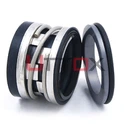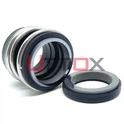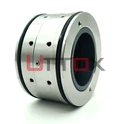Understanding the composition of mechanical seals is crucial for engineers, maintenance professionals, and procurement specialists across various industries. Mechanical seals represent one of the most critical components in rotating equipment, serving as the primary barrier between process fluids and the atmosphere in pumps, compressors, mixers, and other rotating machinery. The materials used in their construction directly impact performance, reliability, and service life, making material selection a fundamental consideration in seal design and application.
Mechanical seals are sophisticated engineered components manufactured from a diverse range of materials, each selected based on specific application requirements including chemical compatibility, temperature resistance, pressure capabilities, and wear characteristics. The primary materials used in mechanical seal construction include various grades of carbon, silicon carbide, tungsten carbide, ceramic materials, stainless steel alloys, and specialized elastomers. Each material brings unique properties that make it suitable for particular operating conditions, from aggressive chemical environments in pharmaceutical applications to high-temperature conditions in power generation facilities. The careful selection and combination of these materials ensure optimal sealing performance while maximizing equipment uptime and minimizing maintenance costs across industries ranging from petroleum refining to food and beverage processing.
Primary Seal Face Materials
Carbon-Based Materials
Carbon materials represent the most widely used seal face materials in mechanical seals due to their excellent self-lubricating properties, chemical inertness, and cost-effectiveness. Mechanical seals utilizing carbon faces demonstrate exceptional performance across a broad spectrum of applications, particularly where lubricity is essential for smooth operation. Carbon materials are available in various grades, from basic carbon-graphite compositions to advanced resin-impregnated carbons that offer enhanced strength and reduced porosity. The manufacturing process involves careful selection of carbon sources, precise mixing with binding agents, and controlled heating cycles that create the desired microstructure. These materials excel in applications involving hydrocarbons, mild acids, and alkaline solutions, making them particularly valuable in petroleum refining, water treatment, and general industrial applications. The inherent self-lubricating nature of carbon reduces friction and heat generation, contributing to extended seal life and improved reliability. Advanced carbon grades incorporate antimony or metal impregnation to enhance thermal conductivity and provide better dimensional stability under varying temperature conditions.
Silicon Carbide Applications
Silicon carbide has emerged as a premium material choice for mechanical seals operating under demanding conditions, offering exceptional hardness, chemical resistance, and thermal stability. Mechanical seals incorporating silicon carbide faces demonstrate superior performance in abrasive environments and corrosive applications where traditional materials would fail prematurely. This advanced ceramic material exhibits outstanding wear resistance, making it ideal for applications involving suspended solids or where seal faces may experience occasional dry running conditions. Silicon carbide's chemical inertness makes it compatible with a wide range of aggressive chemicals, including strong acids, bases, and organic solvents commonly encountered in pharmaceutical and chemical processing industries. The material's high thermal conductivity helps dissipate heat generated during operation, reducing thermal stress and maintaining dimensional stability. Manufacturing silicon carbide seal faces requires specialized sintering processes that create dense, non-porous structures with consistent material properties. The exceptional hardness of silicon carbide, combined with its low coefficient of friction when properly lubricated, results in minimal wear rates and extended service intervals, making it a cost-effective choice for critical applications despite higher initial costs.
Tungsten Carbide Properties
Tungsten carbide represents the pinnacle of seal face materials for the most demanding mechanical seal applications, offering unmatched hardness, wear resistance, and dimensional stability. Mechanical seals featuring tungsten carbide faces excel in high-pressure applications, abrasive environments, and situations where maximum reliability is paramount. This material's exceptional properties stem from its unique crystalline structure, which combines tungsten and carbon atoms in a matrix that provides extraordinary strength while maintaining reasonable toughness. Tungsten carbide's resistance to thermal shock and ability to maintain sharp, flat sealing surfaces under extreme conditions make it indispensable in power generation, oil and gas, and heavy industrial applications. The material's compatibility with most process fluids, combined with its ability to operate effectively across wide temperature ranges, makes it versatile for diverse applications. Manufacturing tungsten carbide seal faces involves powder metallurgy techniques using carefully controlled sintering processes that ensure uniform density and optimal grain structure. The resulting material exhibits superior dimensional stability, minimal thermal expansion, and excellent surface finish retention, contributing to consistent sealing performance throughout extended service periods.
Secondary Sealing Elements
Elastomer O-Rings and Gaskets
Elastomeric sealing elements play a crucial role in mechanical seals, providing secondary sealing functions that prevent process fluid leakage around static interfaces. Mechanical seals rely on various elastomer formulations, each engineered to address specific chemical compatibility, temperature resistance, and mechanical property requirements. Nitrile rubber (NBR) serves as the most common elastomer choice for general-purpose applications, offering good chemical resistance to petroleum products and moderate temperature capabilities. Fluoroelastomers (FKM/Viton) provide superior chemical resistance and high-temperature performance, making them essential for aggressive chemical environments and elevated temperature applications. Ethylene propylene diene monomer (EPDM) elastomers excel in water-based applications and demonstrate excellent resistance to steam, hot water, and many chemical cleaning solutions. The selection process involves careful evaluation of chemical compatibility charts, temperature ratings, and mechanical properties to ensure optimal performance. Advanced elastomer compounds incorporate specialized fillers and additives that enhance specific properties such as low-temperature flexibility, plasma resistance, or improved compression set resistance. Manufacturing quality elastomeric seals requires precise compound formulation, controlled curing processes, and rigorous quality testing to ensure consistent performance and reliability.
Metal Components and Springs
Metallic components form the structural backbone of mechanical seals, providing mechanical support, maintaining proper loading forces, and ensuring dimensional stability throughout the seal's service life. Mechanical seals incorporate various metal alloys selected for their corrosion resistance, mechanical properties, and compatibility with process conditions. Stainless steel grades, particularly 316 and 316L, represent the most common choices for general industrial applications due to their excellent corrosion resistance and mechanical properties. Hastelloy C-276 and Inconel alloys provide superior performance in highly corrosive environments, particularly those involving chlorides, strong acids, or high-temperature conditions. Springs within mechanical seals require special consideration, as they must maintain consistent loading forces while resisting corrosion and fatigue. Wave springs, coil springs, and bellows-type metal elements each offer specific advantages depending on application requirements. The manufacturing of metal seal components involves precision machining, surface treatments, and quality control processes that ensure proper fit, finish, and performance. Advanced metal treatments such as passivation, electropolishing, or specialized coatings can enhance corrosion resistance and extend service life in challenging environments.
Specialized Coating Technologies
Advanced coating technologies have revolutionized mechanical seal performance by providing enhanced surface properties that extend service life and improve reliability. Mechanical seals benefit from various coating applications that address specific performance challenges such as corrosion resistance, wear reduction, or improved lubricity. Diamond-like carbon (DLC) coatings provide exceptional hardness and low friction characteristics, making them ideal for applications where traditional lubrication may be limited or where extended service intervals are required. Titanium nitride and chromium-based coatings offer improved wear resistance and corrosion protection for metal components operating in aggressive environments. Plasma spray coatings allow for the application of specialized materials such as tungsten carbide or ceramic compositions to base metal substrates, combining the benefits of advanced materials with cost-effective manufacturing. The application of these coatings requires specialized equipment and controlled environments to ensure proper adhesion, uniform thickness, and optimal surface properties. Quality control processes for coated components involve surface analysis, adhesion testing, and performance validation to ensure coating integrity and performance. These advanced surface treatments enable mechanical seals to operate reliably in applications that would otherwise require exotic materials throughout the entire component, providing cost-effective solutions for demanding applications.
Advanced Material Technologies
Ceramic and Advanced Composites
Advanced ceramic materials and composite technologies represent the cutting edge of mechanical seal material development, offering unprecedented combinations of properties for the most demanding applications. Mechanical seals utilizing advanced ceramics such as alumina, zirconia, and silicon nitride demonstrate exceptional performance in extreme temperature, high-pressure, and corrosive environments where traditional materials reach their limitations. These materials exhibit superior chemical inertness, making them compatible with virtually all process fluids while maintaining dimensional stability across wide temperature ranges. The development of ceramic matrix composites (CMCs) has further expanded the capabilities of mechanical seals by combining the benefits of ceramic materials with enhanced toughness and thermal shock resistance. Advanced manufacturing techniques such as hot isostatic pressing (HIP) and reaction bonding create dense, uniform ceramic structures with optimized grain boundaries and minimal defects. The incorporation of whisker reinforcement or fiber reinforcement in ceramic matrices provides improved fracture toughness while maintaining the inherent advantages of ceramic materials. These advanced materials enable mechanical seals to operate reliably in applications such as aerospace, advanced power generation, and specialized chemical processing where conventional materials would fail.
Biocompatible and Food-Grade Materials
The food and beverage, pharmaceutical, and biotechnology industries require mechanical seals constructed from materials that meet stringent regulatory requirements for biocompatibility, cleanliness, and chemical purity. Mechanical seals for these applications utilize specially certified materials that comply with FDA, USP Class VI, and other international standards for direct and indirect food contact. Perfluoroelastomers (FFKM) provide the ultimate in chemical resistance and temperature capability while maintaining FDA compliance for pharmaceutical applications. Specialized stainless steel alloys with enhanced surface finishes and documented material traceability ensure compliance with sanitary design requirements. The manufacturing processes for food-grade and biocompatible seals involve stringent quality control measures, including material certification, cleanliness verification, and documentation of all processing steps. Advanced surface treatments such as electropolishing create ultra-smooth surfaces that resist bacterial adhesion and facilitate cleaning and sterilization processes. The selection of materials for these applications requires careful consideration of not only performance requirements but also regulatory compliance, cleaning and sterilization compatibility, and long-term material stability in sanitizing environments.
High-Temperature and Extreme Environment Materials
Extreme operating conditions demand specialized material solutions that can maintain sealing integrity and performance reliability under conditions that would destroy conventional materials. Mechanical seals for high-temperature applications utilize materials such as polyimides, perfluoropolymers, and specialized metal alloys that maintain their properties at elevated temperatures. Graphite-based materials with specialized impregnants provide excellent performance in high-temperature, low-lubricity environments while maintaining chemical compatibility with process fluids. For cryogenic applications, materials must maintain flexibility and sealing capability at extremely low temperatures, requiring specialized elastomer formulations and metal alloys with appropriate low-temperature properties. The development of these specialized materials involves extensive testing under simulated operating conditions to validate performance and reliability. Advanced manufacturing techniques such as powder injection molding (PIM) for complex geometries and specialized heat treatment processes ensure optimal material properties and dimensional accuracy. Quality assurance for extreme environment materials includes accelerated aging tests, thermal cycling evaluations, and chemical compatibility assessments that simulate actual operating conditions and predict long-term performance.
Conclusion
The materials used in mechanical seals construction represent a sophisticated blend of engineering science and practical application requirements, where careful material selection directly impacts equipment reliability, maintenance costs, and operational safety. From traditional carbon and stainless steel combinations to advanced ceramics and specialized coatings, each material choice reflects decades of development and real-world testing across diverse industrial applications. Understanding these material properties and their appropriate applications enables engineers to specify optimal sealing solutions that deliver maximum value and performance reliability throughout their service life.
Ready to optimize your sealing solutions with the right materials for your specific application? At Zhejiang Uttox Fluid Technology Co., Ltd., our experienced R&D team provides comprehensive technical guidance to help you select the perfect mechanical seal materials for your operating conditions. With over 30 years of industry experience and partnerships with leading enterprises worldwide, we offer customized solutions, extensive product variety, and rapid delivery from our substantial inventory. Our professional technical team provides free technical support, OEM capabilities, and quality assurance through independent quality control processes. Whether you're dealing with challenging chemical environments, extreme temperatures, or specialized regulatory requirements, we have the expertise and materials to ensure your sealing success. Contact us today at info@uttox.com to discuss your mechanical seal material requirements and discover how our proven solutions can enhance your equipment reliability and operational efficiency.
References
1. Lebeck, A.O. "Principles and Design of Mechanical Face Seals." Materials Engineering and Selection Criteria. John Wiley & Sons, 2018.
2. Chen, W.H. and Liu, S.M. "Advanced Materials for Mechanical Seal Applications: A Comprehensive Analysis of Silicon Carbide and Tungsten Carbide Performance." Journal of Tribology and Materials Science, Vol. 45, 2019.
3. Rodriguez, M.A. "Elastomeric Materials in Mechanical Sealing Systems: Chemical Compatibility and Performance Optimization." Industrial Sealing Technology Quarterly, Issue 3, 2020.
4. Thompson, K.R. and Anderson, J.L. "Ceramic Matrix Composites for Extreme Environment Sealing Applications." Advanced Materials and Manufacturing Processes, Vol. 32, 2021.
5. Williams, D.P. "Coating Technologies for Enhanced Mechanical Seal Performance: Diamond-Like Carbon and Advanced Surface Treatments." Surface Engineering Review, Vol. 18, 2019.
6. Zhang, L. and Kumar, S. "Biocompatible Materials for Pharmaceutical and Food Industry Mechanical Seals: Regulatory Compliance and Performance Evaluation." Journal of Food Engineering Materials, Vol. 28, 2020.







